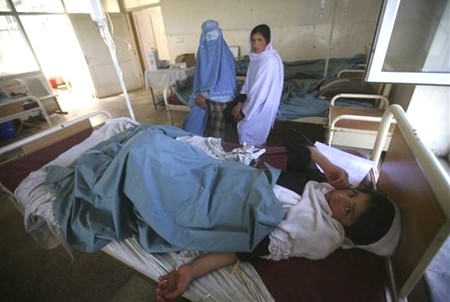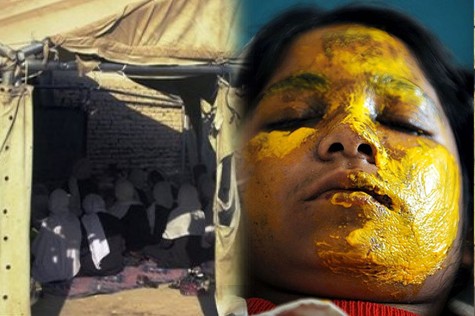Resuming the schooling of Afghanistan's girls became a much-celebrated post-Taliban achievement for the international community, but that success is now at risk. Six schools in the northern region of Kunduz closed following Taliban threats in recent weeks. The German army says it can't protect them.

Nabela 9, an Afghan school girl looks on as she recovers in a hospital after she feels sick in a school in Kapisa province, May 12, 2009. Nearly 100 girl students and teachers of a school in Kapisa province, 80 km north of the Afghan capital Kabul, were mysteriously poisoned. (Photo: AP)
One of the most significant and widely-touted successes in the rebuilding of Afghanistan -- schooling for girls, which was banned under the Taliban -- is at risk after six girls' schools were closed in the northern province of Kunduz following threats from Islamic terrorists in recent weeks.
The schools received letters threatening acid and gas attacks, and teachers and pupils responded by staying home. The Afghan authorities finally decided to shut the schools altogether.
The affected district of Chahar Darreh in the province of Kunduz is largely under the Taliban's control -- some of the Pashtun people who live in the area support them.
The German army, which has led a reconstruction team in Kunduz since 2003, doesn't feel able to protect the schools, and the German government doesn't know how to respond to the threats.
It's not just threats -- last week, a girls' school in northeastern Afghanistan was hit with an apparent poison gas attack, requiring the hospitilization of 84 students and 11 teachers who collapsed with headaches and nausea. The case marked the region's third alleged poisoning at a girls' school within roughly two weeks.

Shamsia, an Afghan school girl, in a hospital after two men on a motorbike threw acid on her in Kandahar, Afghanistan, Nov 12, 2008.
Militants in southern Afghanistan have assaulted schoolgirls in the past -- spraying acid in their faces and burning down their schools. Afghan girls were forbidden to attend school under the Taliban's rule and many conservative extremist groups continue to oppose the idea.
Providing schooling for Afghan girls has been one of Berlin's main arguments for justifying the military mission, which is increasingly unpopular among German voters. Germany has about 3,800 troops in Afghanistan and Berlin has resisted pressure from allies to send German soldiers to the more dangerous south of the country, where allied forces are battling the Taliban. Most of the German soldiers are in northern areas.
Recently, Chancellor Angela Merkel included the "six million schoolchildren, among them very, very many girls" as one of the "creditable successes" of the German reconstruction team. "During my visit to the northern part of the country, I was able to see that for myself," she told reporters.
Merkel was at the German military bases in Kunuz and Mazar-i-Sharif at the beginning of April and visited a school there. The Federal Ministry for Economic Cooperation and Development announced it had "great concerns" regarding the closure of the schools. The advancement of girls is "one of the focal points of the German development cooperation," a representative said.
The Afghan government "must do everything they can so that girls can regularly and safely go to school."



